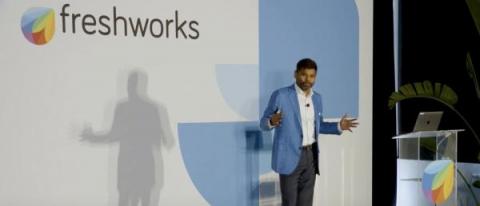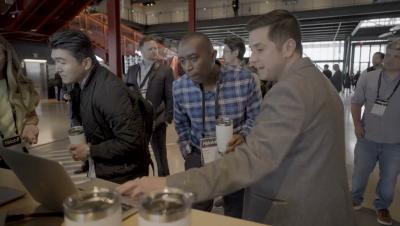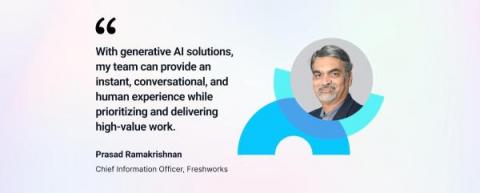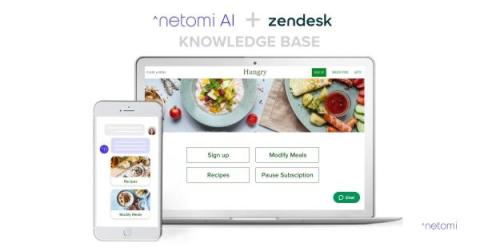Teams | Collaboration | Customer Service | Project Management
June 2023
AI as a Tool for Creativity in Miro: The Quick Brown Fox Jumps in for a Tool Tour
Freshworks brings generative AI to the Fortune 5 million
During Freshworks’ Q2 ’23 Launch Event on June 22, we unveiled new product features that can bring the power of generative AI to businesses of any size. Access to AI is necessary for these new tools to have lasting business impact. The market for generative AI is expected to reach $36 billion by 2028, a tenfold jump in five years. “AI is just not a buzzword anymore,” Freshworks founder and CEO Girish Mathrubootham explained to Diginomica.
How AI Can Cut Costs in Manufacturing
Boost Workplace Productivity with AI-Powered HR Tools
How AI infused immersive CX can help retailers win the battle for customer loyalty
The money in our wallets doesn’t go as far as it used to. Prices are increasing—the cost of low fat milk was around forty five per cent cheaper in December 2021 than today. Meanwhile, the phenomenon of ‘shrinkflation’, a form of hidden inflation, means we’re all paying more and getting less in return. Companies across the board, from small independent businesses right up to the biggest retailers in the country, are finding it hard too.
Shaping the future of intelligent CX with Zendesk AI
The world is changing and customer experience is shifting alongside. Advances in technology, combined with new and ongoing business challenges, put us all under pressure to continue to evolve, improve and do more for our customers. Many businesses have managed through supply chain disruptions, rising costs and the ongoing shift into the digital landscape – all while under a cloud layer of ongoing economic uncertainty. Companies are faced with tightening margins and cutting costs.
How AI is boosting agent intelligence - and evolving the CX team
Despite the hype, AI isn’t here to replace your human agents. On the contrary, when human agents and AI join forces, they form a powerful CX team – one that builds on their strengths, while minimising their weaknesses. Your agents shouldn’t be bogged down by busy work. With AI in their corner, they can instead focus on the tasks that make a difference. Which results in a better experience for all involved.
Unlocking the Magic of AI Chatbots: Delving into the Unique Worlds of GPTChat, Bard and Jasper
Unified experiences, supercharged with AI
Building software that delivers value to customers comes naturally to us at Freshworks. Sometimes, it also comes “artificially”—such as through innovations in artificial intelligence, including generative AI. Businesses around the world are already realizing the transformative potential of generative AI through automation and productivity-enhancing tools.
How tech companies are using AI to control costs in 'year of efficiency'
In response to macroeconomic pressure, technology companies of all sizes have been tightening their belts and flattening their org structures. Meta CEO Mark Zuckerberg has called it the “year of efficiency”, while others are calling it the “end of the tech boom”. But despite budget challenges, tech companies have reason to hope.
How manufacturers can cut service costs with AI and automation
It’s fair to say the manufacturing industry is on the fast track to digital transformation. The pandemic exposed the fragility of our global supply chains, resulting in empty shelves and overstocked warehouses. Meanwhile, as the pandemic subsides, inflation is driving up the cost of goods and logistics, putting the squeeze on companies still recovering from the past few years. So it’s no surprise that manufacturers are looking for ways to cut costs whilst still maintaining quality.
Harness the power of AI
Understanding AI in the workplace
For over 50 years scientists have talked about the benefits and dangers of AI (artificial intelligence). These range from freeing up our time to live a more leisurely life, all the way to wiping us out entirely. Until recently, however, the hype was completely unjustified. The joke being that truly useful AI, like nuclear fusion, was always ten years away. In the last 6 months, at least in the mind of the general public, that perception of AI as an over-hyped technology has begun to change.
How to stay agile with Zendesk AI
Freshworks CIO on generative AI's impact on service management
The disruptive nature of generative AI in business is becoming apparent. We sat down to chat with Prasad Ramakrishnan, chief information officer (CIO) at Freshworks, to understand how he believes generative AI will impact and transform the service management industry. Here’s what he has to share with CIOs on how generative AI can be leveraged to improve employee experience and agent productivity.
AI can make work more human
Take a moment to consider a world where people are thriving in their jobs because of A.I., not in spite of it.
Remove repetitive tasks with AI
How to Maximize Your Zendesk Knowledge Base with AI (Updated for January 2024)
The modern customer wants self-service. That’s why, over the past few years, we’ve seen companies build out robust Knowledge Bases (or Help Centers) on Zendesk and other leading customer experience platforms. Zendesk Knowledge Base solutions are team publishing libraries covering recurring topics and questions on products and services. Another way that companies provide self-serve support options is by launching customer service chatbots.
How to control customer service costs and save time
Welcome to Showcase: where we shine a light on the intelligent heart of customer experience
Customer experience is now shaping the way companies across the world do business. We’ve seen companies thrive based on their ability to listen to their customers’ needs and keep up with the latest trends. The latest developments in artificial intelligence (AI) provide a bounty of opportunities and possibilities for businesses to rise to the challenge, and deliver seamless, personalised, and immersive experiences for their consumers.
Google Search AI Chat: A Visual, Personal, and Interactive Experience
Generate Conversational AI Personality | Webinar
How will AI impact customer service?
Top Zendesk features you don't want to miss
Asana Leads Second Wave of Digital Transformation: Announces Human-Centric AI Features for Collaborative Work Management
Asana's 5 guiding principles for human-centered AI
We see enormous potential for AI to empower teams to work together more effectively and efficiently.

























